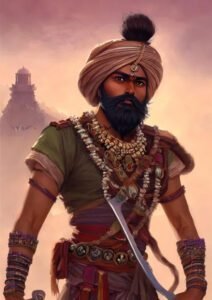Friedrich Max Müller: A Scholar with Cross-Cultural Influence

Friedrich Max Müller, born in 1823, was a polymath of the 19th century, whose intellectual pursuits spanned linguistics, comparative religion, and the study of ancient Indian texts. His work had a significant impact on the academic world and influenced Europe’s perception of India during the colonial era.
Early Life and Academic Journey
Max Müller’s journey into academia began with a classical education that emphasized Greek and Latin. He pursued his passion for language, eventually leading him to Leipzig University, where he studied Sanskrit and comparative philology. His time at the university exposed him to the works of influential linguists of his era, notably Franz Bopp and Friedrich Schlegel, who had already laid the groundwork for the study of Indo-European languages and their historical connections.
Contributions to Linguistics
One of Max Müller’s most enduring legacies lies in his contributions to linguistics. He advanced the notion of a common Indo-European language, which he termed “Aryan.” His research established that various Indo-European languages, such as Sanskrit, Greek, and Latin, shared a common linguistic ancestry. His work paved the way for a deeper understanding of language evolution and the historical relationships between different language families.
However, it’s crucial to emphasize that modern scholarship has moved away from using the term “Aryan” in the same manner as Max Müller, as it has been associated with problematic racial theories that have since been discredited.
Sanskrit and Indian Culture
Max Müller’s fascination with Sanskrit and ancient Indian texts led him to delve into India’s rich cultural and religious heritage. His translations and interpretations of Vedic hymns and texts significantly contributed to the broader comprehension of these essential components of Hinduism. He made these texts accessible to a Western audience, greatly influencing the perception of India’s spiritual and philosophical traditions.
Pioneering Comparative Religion
In addition to linguistics and Sanskrit, Max Müller made notable contributions to the field of comparative religion. He believed that by studying the world’s religions comparatively, it was possible to uncover universal truths about human spirituality. His work helped promote cross-cultural understanding, emphasizing the commonalities among religious traditions.
Engagement in India and Europe
Max Müller’s work garnered recognition both in Europe and India. Although he never visited India personally, his scholarship was well-received by Indian scholars and leaders. He maintained correspondence with influential figures like Swami Vivekananda and Raja Ram Mohan Roy, contributing to a cross-cultural exchange of ideas and knowledge.
In Europe, Max Müller’s influence extended beyond academia. His writings painted India’s religious and philosophical traditions as profound and ancient, contributing to the fascination with Eastern spirituality that gained momentum in the late 19th century. His work played a crucial role in shaping European perceptions of India during the colonial period.
Legacy and Contemporary Evaluation
Max Müller’s legacy remains that of a dedicated scholar who made important contributions to linguistics, comparative religion, and Indian studies. His work laid the foundation for further research and cross-cultural dialogue, and it continues to be studied and evaluated in the context of modern scholarship.
However, it’s important to note that some of Max Müller’s theories and concepts have evolved or been critiqued in contemporary scholarship. Particularly, his notions regarding the Aryan race and cultural diffusion have been reevaluated and adjusted to reflect a more nuanced and complex understanding of India’s heritage.
In conclusion, Max Müller’s work epitomizes the cross-cultural intellectual exchange that was characteristic of the 19th century. His scholarship, while influential in his time, continues to be a subject of study and reevaluation in contemporary academia.







